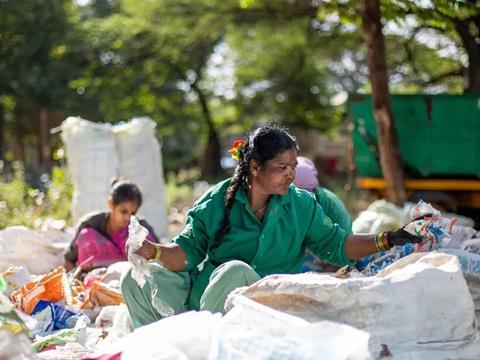
A new $21 million collaboration between Unilever, the United States Agency for International Development, and EY is aiming to support entrepreneurs and small businesses across the plastics value chain to scale solutions that reduce plastic use, tackle plastic waste, and build circular economies.
The companies say that the project, CIRCLE, has a particular focus on women, who they say make up the majority of waste collectors working in the informal sector in the global south.
Rebecca Marmot, Unilever’s Chief Sustainability Officer, says: “CIRCLE’s collaborative model of enterprise acceleration – delivered through a mix of grant funding and bespoke business support – will help scale both new and existing solutions for packaging circularity, whether that’s driving collection and recycling, or reuse–refill models.
“Crucially, it will support many small to medium-sized enterprises (SMEs) and entrepreneurs that offer impactful, market-based solutions but are currently too small to work at the scale we need.”
While CIRCLE’s focus will initially be on India, Indonesia, Vietnam and the Philippines, the plan is to expand to other markets by bringing in new organisations with additional funds to invest.
The project aims to build on methods developed by impact enterprise accelerator TRANSFORM which is led by Unilever, the UK’s Foreign, Commonwealth & Development Office and EY.
Unilever’s investment in CIRCLE includes a cash contribution from its Climate & Nature Fund, an impact-led investment platform through which it claims to be investing €1 billion ($1.1 billion) by 2030 to deliver impact and business benefits.
The company is also contributing to Circulate Capital’s Ocean Fund to support better investment and infrastructure in South and South East Asia, as well as Latin America, where ocean plastic pollution is particularly acute.
At the launch of the project, which took place during Capitol Hill Ocean Week in June, USAID Administrator Samantha Power commented: “The CIRCLE Alliance brings together USAID’s experience in empowering women in plastic waste value chains and our long-standing relationships with national and local governments – and of course, with civil society.
“Unilever has unrivalled knowledge of, and an unrivalled role in, plastic supply chains. EY brings experience in providing professional support to help businesses grow and thrive. This is an incredible foundation for the CIRCLE Alliance.”
Earlier this year, Unilever revised its packaging sustainability goals. In 2017, the company pledged to make 100% of its packaging recyclable, reusable or compostable, reduce virgin plastic packaging use by 50%, and incorporate 25% recycled plastic in its plastic packaging before 2025.
That last objective remains viable, but the others have been watered down – Unilever now plans to reduce its use of virgin plastic by 30% by 2026, and 40% by 2028 – as well as revising the projected end date of its goals to make 100% of its plastic packaging reusable, recyclable or compostable to 2030 for rigid solutions, and 2035 for flexibles.
If you liked this story, you might also enjoy:
How are the top brands progressing on packaging sustainability?
Sustainable Innovation Report 2024: Current trends and future priorities
Reuse vs. single use – which is better for the environment?
The ultimate guide to global plastic sustainability regulation














No comments yet